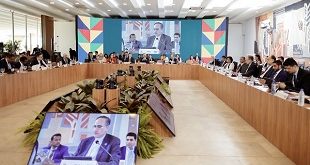
By Eng. Kant Ateenyi Kanyarusoke
If divisionism is so good, why have America, India, and China not considered splitting up?
Andrew Mwenda’s arguments for Africa to remain as politically divided as is now (See “Divided we stand, united we fall” The Independent Feb.14) ought to provoke robust responses from all African patriots.
They must be worried about the fate of the black man in 50 to 100 years’ time. This is because Mwenda cleverly and selectively looks at the present to push a line against one of nature’s most powerful laws – the second law of thermodynamics.
In the context of the discussions, the law leads to one clearly observable phenomenon: Discrete small systems (living or non-living) either rely on big cooperative numbers to survive or are perpetually dependent on or fall prey to bigger ones in any struggle for survival. I discuss and illustrate this law in both natural and human systems in a forthcoming book. As an example, see Figure 1.
Today however, I restrict myself to Mwenda’s points as presented but put them in a perspective of a 200 year period from about 100 years ago when present African countries borders were being concretised by foreigners to 100 years in future when world population will have more than doubled and most present known natural resources will have been depleted.
Mwenda begins by arguing against the current obsession with multiple trade organisations. This is correct but the cause is that we are a confused lot in our many and tiny countries. If 100 years ago, there had been fewer demarcations or if about 50 years ago there had been a revision of the borders, the confusion would be less today. This means if we want to help our descendants avoid similar or most likely worse chaos (2nd law: System entropy or chaos either remains the same or increases: it NEVER drops unless positively worked on), we need to re-look at the borders now.
On Federation of East Africa, Mwenda appeases us by acknowledging potential gains in defence, physical, economic and intellectual size. And then, he correctly points out problems with inertia to make political decisions. This is fine – but who says most of the one billion plus East Africans in 2114 will be concerned with internal politicking as we know it today?
Even now, what fractions of us in our individual tiny units are more concerned about politics than about seeking economic opportunities?
Who benefits?
Every living system’s first obligation and need is self-preservation in form of defence and feeding mechanisms. Because of this, gains from improved defence capability augmented by both internal trade and a bigger intellectual pool, at a time when the world will be over-crowded, far outweigh the disadvantages of increased political inertia.
This is why the majority of today’s Americans or Indians or Nigerians will not want to split up in spite of the huge federal inertia.
I could develop this argument further but let us turn to the point on innovations.
With his solid grounding in the Humanities, one can appreciate Mwenda’s obsession with politics. Thus, we agree political innovation in big systems is a nightmare. But again who says political innovation is the only necessary and sufficient precondition to society’s forward match?
On the contrary, ancient and contemporary history shows that it is leadership ability to knowingly or unknowingly use laws of nature to harness available resources for one’s benefit that empowers him/her.
And when extended to others, then powerful politicians emerge to claim society leadership or governance. From the invention of fire making by friction, through invention of the wheel, iron smelting and forging; gun powder making and the compass invention in China, agricultural and industrial revolutions in Europe to nuclear fission and fusion and interplanetary travel in US and USSR: powerful politicians have grown on the shoulders of innovators and inventors.
This is why even today; America, Canada, Australia, South Africa etc. are constantly on a hunt for such people from wherever in spite of local xenophobic/racial undercurrents.
My counter argument here is that Scientific and Engineering innovation thrive best in bigger political units because of several reasons: One – intelligent politicians (of which bigger countries are not short of) quickly understand these as a source of real power: thus they shield them against huge bureaucracies when compared to other professionals; Two – the bigger population provides a bigger pool of specially talented people to make inventions that help move the bulk of society forward (the reason India and China are not so much bothered about poaching scientists yet they are currently – in relative terms – making the fastest progress on the planet). Three – Even at Mwenda’s 10% (not quite accurate) superiority rate, the more the trials, the better. Smaller populations will have fewer trials and thus much fewer successes. I could go on but let us turn to speed and cost of propagation of successful ideas.
On a continent of one billion people in 54 tiny countries, Mwenda tells us mayors are flocking to Rwanda of 10 Million to try to learn how Kigali is run. Two questions unexplored are: are they learning? If so, would they have learnt faster and cheaper if Rwanda were a state in a federated Africa?
Clever Mwenda, he curses the bureaucracy and corruption in Uganda (as if Uganda is really big) but omits the continental Water Utility Management Consultancy set up by Dr. William Muhairwe at National Water and Sewerage Corporation. That aside, why not contrast this with the spread of bigger South Africa’s ideas of Ubuntu and ‘Broad Based Black Economic Empowerment (3B2E) across the provinces or Uganda’s once innovative resistance councils within these ‘bigger’ units?
The point here is that a good idea or even product spreads faster and cheaper in one political entity than when it has to cross many international borders. This is because more people than just bureaucrats or technocrats or even politicians get involved in its transfer since there is more mixing of populations. What is therefore required is for federated states to be given liberty to innovate provided they meet a minimum agreed code of ethics.
Let me now turn to his attack on the Customs Union. He argues that it will benefit Kenyans and disadvantage Barundi and Banyarwanda because the former supply more skilled labour while the latter supply a larger proportion of unskilled labour. In the short term, yes – and that is the reason why if it were feasible we would rather skip that step and move straight to unification. However, it seems to be a necessary step and we can actually take advantage of it if we care to.
First, having run many factories in a few African countries before, I want to assure all and sundry that unskilled and semiskilled labour are quite as important as the skilled. Secondly, both in industry and at universities, one notices that the propensity to learn and improve one’s lot is greater among the less advantaged than among the privileged. This means present day Rwanda and Burundi citizens would progress faster in presence of Kenyans than otherwise. Thirdly, from economic and geographic considerations, there are industries that are best placed in specific areas: Infrastructural development activities, mining, and agriculture, for example, are geographic specific and can be labour intensive if we care to make them so.
Manufacture of high volume, low value, and low tech products (staple food processing, drinks, detergents, plastics, etc.) are better dispersed throughout a region for reasons of minimising total supply chain costs and maximising chain speed and efficacy. This means Kenya manufacturers of such products would have to disperse across the entire region lest someone else beats them to the market. And in so doing, locals would soon learn from them.
Ask: how did Kenya get to where she is today? Remember, it was the Railway – being built for the more ‘advanced’ and ‘attractive’ Uganda at the beginning of the last century which was the genesis of Kenya’s prowess. With Nairobi built to service the line construction and the British accidental discovery of the temperate highlands during construction – and therefore attempting to settle – and the massive translocation of enterprise savvy Indians to build it, the previously despised Kikuyu quickly learnt commercial farming, business skills and many ‘foreign’ ways of living. These were to spread almost throughout Kenya. Just as it was eventually to be in Uganda – spearheaded by Baganda, and is happening in South Africa now.
Thinking long term
We need to now look longer term. Our medium term objective is to have our grandchildren from Mtwara working or schooling or socialising alongside others from Gabiro, Yei, Puti Puti and say Kajiado – all looking at themselves as nationals of one entity just like today an elite Karimojong socialises with an elite Mukiga.
The second law asserts that we will never get there unless some inconveniences are met along the way!
The argument on trade is put out of context. When we become one country, what Mwenda now calls Regional Trade actually becomes ‘Internal’ Trade. Thus, Kenya’s or Uganda’s or Rwanda’s coffee becomes our coffee as a collective just as today, West Nile’s or Bunyoro’s tobacco is Uganda’s. Regional trade would then be for example when we buy ECOWAS’s cocoa, pea nuts or SADC’s platinum, and coal and they buy our tea, coffee, milk etc. On the world market, our coffee would compete with that from even bigger Brazil as Federal East Africa’s coffee.
The point on discouraging international trade vis-à-vis local trade is correct. But why should one think this is necessarily bad? Take tea and coffee for example: Even at today’s population and development levels, a union would very easily justify Instant Tea and Coffee factories and even canned processed foods for the bigger single middle class market.
This would mean we export less of the raw stuff to the international market yes, but probably we could have a surplus for our fellow Africans in SADC and ECOWAS. What is wrong with that?
Look at China. These guys produce more tobacco than the rest of the world combined but they export zero – in fact they even import it. I am sure Mwenda knows that every serious business needs a home market first and foremost – where it is relatively secure whether out of sentimental or cost advantage basis.
This has been Africa’s curse ever since colonialism: We were meant to produce for others as they produced for us. We became part of other people’s ‘home’ market as if we were homeless. Thus no wonder, the dependence syndrome we have been entrapped in.
In sub-Sahara Africa, only South Africa and Zimbabwe really attempted to develop a local market – thanks to sanctions imposed on those two during colonial and Apartheid eras.
Let me end by tackling Mwenda’s warming to the Coalition of the Willing (COW). I actually support it only out of frustration – and my wish is that it progresses fast enough to convince Burundi and Tanzania to get on board. But it has one main problem: it is simply a gentleman’s agreement between the three (and a half – if we consider South Sudan’s Salva Kiir) principals.
If anything happened to one of these, or if the politics in any of the coalition partners should change, we could easily end back at square one. At the very least, we need something more concrete in form of a real move to a union of the COWs with sweetened openings for others to join when convinced.
Mwenda’s suggestion of selective industry protection in the region cannot work for the very reasons he gives against full integration. Kenya with its coastline and better developed industrial sector will still produce most products cheaper than any other – and would thus feel cheated if asked to close or not to develop them just because Kigali or Juba wanted to produce them.
Soon you would have a kind of duplication that we seem to be seeing in the nascent oil sector: Uganda wanting a refinery (which I have always supported on grounds of refusal to donate more valuable by-products for free). If however, the oil was for a Federal East Africa as a whole, it would have mattered less where it is refined: Hoima, Mombasa, or even future Lamu.
Kant is a pan Africanist Industrial – Mechanical Engineer, completing his ‘Solar Engineering Design for sub-Sahara Africa’ Doctorate research among other things.
 The Independent Uganda: You get the Truth we Pay the Price
The Independent Uganda: You get the Truth we Pay the Price



